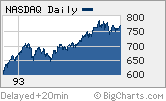This is an update of a story that originally ran on July 26.
NEW YORK (CNN/Money) -- These days, it seems like politics, not profits, matter most on Wall Street.
Election Day is finally here and with many polls showing a dead heat, the market has been a bit jittery lately, despite a round of strong third-quarter earnings reports. Tech stocks, in particular, have been extremely volatile. You know that old Wall Street saying about the market hating uncertainty.
To some extent, this is to be expected. "Election years are typically not good for tech stocks. I'm not sure why that's the case," said Mark Herskovitz, manager of the Dreyfus Premier Technology Growth fund.
But are investors focusing too much on the election, at the expense of strong fundamentals? Several tech observers think so.
Mark Stahlman, a tech hardware analyst with Caris & Co, said the last time that tech earnings were so good but stock performance didn't reflect it was about a dozen years ago.
Stahlman said he sees several parallels between what is happening now with tech stocks and what took place leading up to the 1992 election.
Shades of 1992
To wit, the Nasdaq surged 57 percent in 1991 as the economy sprang to life. Last year, it was up 50 percent as the economy emerged from a recession.
 |
|
| After a strong 1991, techs struggled up until the 1992 election. |
"In the early 1990s, we were coming out of a recession and you typically expect a burst of tech spending. That's what we witnessed last year. That pattern is quite analogous," said David Joy, capital markets strategist with American Express Financial Advisors.
What's more, the Nasdaq's gains from 1991 continued in the early part of 1992, with the composite up as much as 10 percent through mid-February. This year, the Nasdaq tacked on another 7.5 percent by late January.
 |
|
| Does this look familiar? |
But by the end of July 1992, despite solid second-quarter results, the Nasdaq had fallen 12 percent from its highs for the year. Investors were not impressed when several companies, including IBM and Apple, reported results that were lower than expectations.
This year, the Nasdaq, despite strong second-quarter and third-quarter tech results, is currently about 8 percent off its 2004 peak.
When politics are dominating the headlines, it's tough for investors to focus on financials. "To put it politely, people are distracted," Stahlman said.
Tech takes off after November?
But here's the good news. The Nasdaq surged 11 percent between Election Day of 1992 and the end of the year, despite the election of a Democrat (usually perceived as less friendly to big business), and finished 1992 with a 15 percent gain.
 |
|
| Techs surged after the 1992 election and the momentum carried into 1993. |
So if you look at what happened to tech stocks in 1992, you could make a good case for a strong rally once it becomes clear who the winner will be... regardless of whom the actual winner is. (Although a Ralph Nader upset victory would probably throw a monkey wrench in that theory.)
Barry Ritholtz, chief market strategist with Maxim Group, thinks another late-year tech stock spike is possible and agrees that it doesn't matter who the winner is. As long as a winner is declared in a timely fashion (unlike in 2000) then the markets should breathe a sigh of relief.
"Once we get past the election, the odds favor a year-end rally. There are no guarantees but that is the traditional pattern," said Ritholtz.
| More about the election
|

|
|
|
But Stahlman thinks that techs could do more than just enjoy a year-end rally, pointing out that in 1993, techs had another strong year, with the Nasdaq gaining an additional 15 percent.
Simply put, he thinks it will be tough for the market to continually ignore strong fundamentals. So tech stocks should be in good shape as long as earnings remain healthy when investors are ready to pay attention to earnings again.
To that end, analysts are currently predicting 32 percent year-over-year earnings growth for the S&P 500 technology sector in the fourth quarter of 2004 and 15 percent gains in 2005, according to Thomson/Baseline.
"Back in the early 90s, people were worried about inflation, oil and geopolitical concerns. Lo and behold, it's déjà vu all over again," said Kevin Landis, chief investment officer with Firsthand Funds, an asset management group that specializes in tech investing. "But what eventually trumped all of these concerns was the fundamentals."
Some differences worth noting
Of course, there are other key factors that shouldn't be ignored.
The threat of terrorism, for example, is much greater now than it was 12 years ago. That could weigh on tech stocks and the broader market.
Also, there are some differences between Kerry and Bush that could have an effect on tech stocks.
"Some of the tax proposals that are part of the Democratic platform do call for the rollback of dividend tax cuts. That has a direct impact on the stock market," said Joy. This is key now that some big techs, most notably Microsoft and Qualcomm, have started to pay dividends following last year's dividend taxation law changes.
And of course, there is the issue of valuation. Even though techs have had a pullback this year, the S&P technology sector is still trading at 22 times earnings estimates for 2005, about a 35 percent premium to the overall market.
"What the market is having trouble with isn't that business is bad but that tech stocks are expensive. We're not sure whether the level of earnings is good enough to move stocks even from here," said Herskovitz.

|